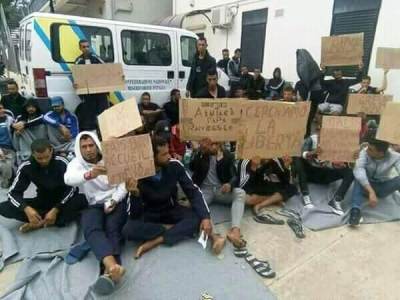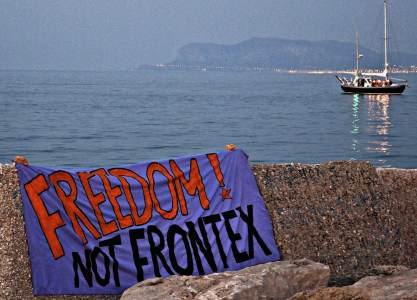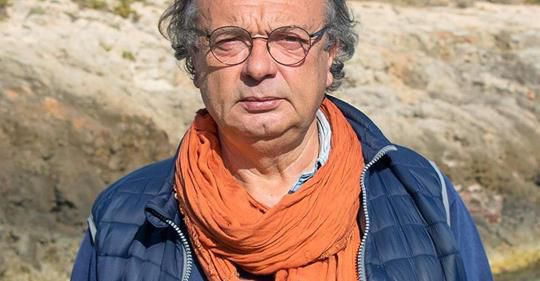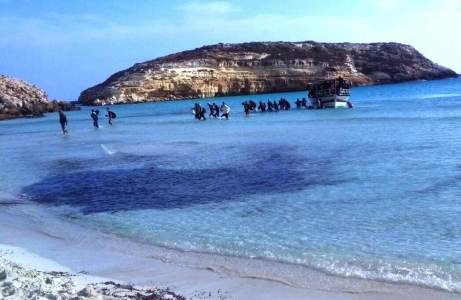The Voices of Those Who Are Thrown Back by the Walls and a Lethal Indifference
In these muggy August days we have been reading tales of violence
meted out on migrants in various ways: from the politician who comes up
with a decree to prevent acts of solidarity extended to migrants asking
for food, to teenagers who have died from the crushing effects of a
society which remains indifferent to their attempts to reach their
parents, all the way up to the shameful punitive deportations of the
migrants living throughout many Italian cities. The climate we are
living through is the result of a growing institutional racism, one
which both creates and legitimates violence, which raises walls – and,
above all, kills, because the sea continues to wash bodies up on the
shores. The last 5 such bodies on August 21st.
We’ve been forced to ask ourselves if anyone will ever respond to
these murders. Whether it’s the life of a Syrian baby of only 8 months
or that of a 16-year-old Nigerian woman, they matter less than that of our children. It is clear that for many politicians migrant
lives continue to have no value at all, because this is the only way
that you can justify the incomplete incompetence in the face of a
inevitable, unstoppable – in a word, natural – phenomenon. Even if this
is a reality which we don’t want to see, which we don’t want to accept,
from which we defend ourselves through indifference, encouraged by
televisions and newspapers, which make no reference to the continued
massacres at sea undertaken in the name of democracy and security.
This indifference and fear even generate deportations, above all of
Egyptians and Moroccans, from Trapani and Agrigento back to their home
countries. There not being enough spaces in the detention centres,
however, the police stations have once again started handing out the
infamous “seven day” notices. Over the last two months it has again been
possible to meet people abandoned in the middle of the night on the
dockside at Porto Empedocle or in Agrigento’s town centre, outside of
any institution. These are migrants who have spent days, weeks or months
on Lampedusa, only to be left in the street by the police who have
ferried them over to Sicily, and who have to wait, wandering the streets
at night until they take a bus to Catania or Palermo, in the search to
make up some time. Those we met on the road refused every kind of help
from us, even a bottle of water, so scared are they by everything they
have seen till now of the Italian reception system, comprised only of
psychological pressure, abandonment and rejections.
“You Italians come to our countries for your holidays, you take
the little that’s left there for us, you put us into the hands of the
most terrifying people who abuse, torture and kill people without any
qualms, and if then one of us manages to arrive here, you treat us worse
than the cats and dogs to which you give so much love and attention; we
are worth more than animals, we are people. When I first arrived in
Italy I slept in wet clothes for two nights in Lampedusa, then you threw
me out like the worst of dogs left stray in a place full of ferries,
the ground all wet and dirty, the air full of fumes, and now, at the
end, accompanied by a squadron of soldiers, you leave me with a piece of
paper which tells me to get myself back home, you leave me in the
street without any directions or help. And the people look at us with
disgust and don’t even come near to us, but instead they run away as if
we have ebola.”
This is the outburst we heard from M, a young Morrocan man, who we
met by chance at the Palermo train station, confronted with the total
indifference of institutions and today’s politicians, a man who has been
left on the island with the idea that he will go to Rome and take an
airplane back to his country. M’s other companions have instead been
sent back to Cairo and Tunis via the airplanes used periodically for
forced repatriations.
The same fate has befallen to young people of various nationalities
who have been deported from Ventimiglia by force and violence to the
Hotspot at Trapani. Among the recent group of around 50 people, among
whom were Egyptians, Moroccans and Tunisians everyone was deported save
for the Kurds and Sudanese, who have been placed in reception centres.
The situation at Lampedusa remains very serious, with the centre
always at the point of collapse due to the overcrowding and the lack of
appropriate separation among women, men and children who stay there for
weeks. There are always a number of minors within the island’s Hotspot,
who have been wandering away from the centre in these summer evenings
(via the well known hole in the fence) so as to take a walk among the
swathes of tourists. Beyond this, in recent months the Egyptians brought
to Lampedusa have experienced various fates: some have been deported,
while others have been rejected and abandoned on the mainland. A couple
of days ago the news arrived that, on the feast day of Saint
Bartholomew, a fire broke out in one of the Hotspot’s dorms.
But even those who manage to bypass the trafficker’s channels,
organising their journeys autonomously, have been intercepted and
returned to sender. The North Africans – mainly Tunisians – who arrived
at Pantelleria, Favignana and along the coast of Mazara in general, have
been sent back by planes from Palermo. We do not know the fate of these
young people once they arrive in their own countries, but we have a
rough idea thanks to the testimony of J, a Nigerian man, who found
himself in Lagos again about a month back:
J. contacted us asking for help and, in a trembling voice, told us
about his journey here and back again which began about a year ago from
Northern Nigeria. Having survived the desert, the traffickers, the pains
of seeing his friends die along the road, the ferociousness of the sea,
he did not however get passed the walls thrown up by European politics,
and was sent back after being transferred from Lampedusa to Catania and
finally to Rome, where he was packed like an animal on a plane and
landed in Nigeria.
“My suffering is like a curse, my life doesn’t make sense
anymore. Help me, I have this document in my hand, no one told me what
was going on in my life, they took me like a package and put me on a
plane; I’ve been treated like a terrorist, abandoned here in Lagos; I
have nowhere to sleep, I can’t go back to my home, it’s better for my
family to believe that I’m dead, I have nothing left, they even took my
soul, please help me.”
To make an appeal from Nigeria requires money and time, both things
which J. doesn’t have. His life, like that of so many others, means
nothing to Europe, and has never meant anything to them.
“J. I’m sorry, there are no other options, may God watch over you.” The line fails.
Alberto Biondo
Borderline Sicilia
Project “OpenEurope” – Oxfam Italia, Diaconia Valdese, Borderline Sicilia Onlus
Translation: Richard Braude




